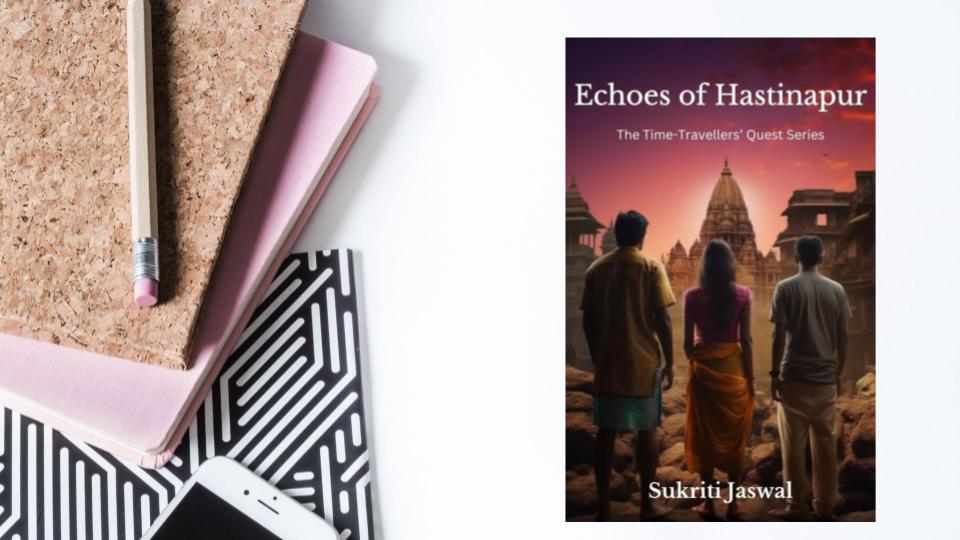The idea of mixing present and past has always sounded fascinating and acts as a strong trigger for imagination. Sukriti Jaswal’s “Echoes of Hastinapur: Uncover Hidden Legends in a Thrilling Quest Through India’s Epic Past’ is a captivating fusion of ancient mythology and modern-day adventure, setting the stage for a thrilling journey through the timeless narrative of the Mahabharata. As the first installment in “The Time-Travellers’ Quest” series, this novel takes readers on an exhilarating ride, blending the mystical and the historical with the gritty realities of contemporary life.
The story begins with an ordinary man, living an ordinary life, who suddenly finds himself swept into a world where the legends of the Mahabharata are not just stories but living, breathing realities. The protagonist, whose life is irrevocably changed by his encounter with a mysterious artifact, becomes an unlikely hero in a saga that stretches back thousands of years. This is a world where gods like Lord Krishna walk among mortals, and where the ancient conflicts of the Mahabharata are reimagined in vivid detail. Jaswal’s ability to transport the reader into this world is one of the novel’s greatest strengths. Her portrayal of the ancient past is richly detailed, with vibrant descriptions of the settings, characters, and events that make up this epic tale. From the grand palaces of Hastinapur to the dense forests where ancient sages once meditated, every scene is crafted with care, drawing the reader deeper into the story.
The protagonist’s journey is both physical and spiritual as he navigates the trials of the Mahabharata while also grappling with the complexities of his own identity. Thrust into a world where trust is scarce, and danger lurks at every corner, he must rely on his wits and the guidance of Lord Krishna to survive. Jaswal skillfully balances the action and intrigue with moments of introspection, allowing the protagonist’s character to develop in meaningful ways as he faces the challenges of this ancient world. The novel’s cast of characters is as rich and varied as the Mahabharata itself. Lord Krishna, with his divine wisdom and enigmatic smile, serves as both guide and protector, helping the protagonist navigate the treacherous waters of this ancient tale. Duryodhana, ever the cunning antagonist, is portrayed with a complexity that makes him more than just a villain—he is a formidable foe, driven by his own sense of righteousness and ambition. His uncle Shakuni, the mastermind behind many of the Mahabharata’s darkest schemes, is as devious as ever, watching the protagonist’s every move with a calculating eye. At times, the readers are reminded of the discussion between Arjun and lord Krishna during the Mahabharata through the protagonist and his dialogue with lord Krishna.
But perhaps the most intriguing aspect of “Echoes of Hastinapur” is the mysterious enemy from the protagonist’s own time. This hidden foe, whose identity remains shrouded in mystery, adds an additional layer of tension to the story. The presence of a modern-day adversary in an ancient world creates a fascinating dynamic, as the protagonist must not only survive the trials of the Mahabharata but also uncover the identity of this contemporary threat. The suspense is palpable, keeping the reader on edge as they try to piece together the clues alongside the protagonist.
Jaswal’s writing is engaging and accessible, making the complex narrative of the Mahabharata approachable for readers who may not be familiar with the original epic. She deftly weaves together the past and present, creating a seamless narrative that bridges the gap between these two worlds. The pacing of the novel is brisk, with enough twists and turns to keep the reader hooked from beginning to end. “Echoes of Hastinapur” is more than just a retelling of the Mahabharata; it is a reimagining that brings new life to these ancient tales. By placing a modern protagonist in the midst of this epic narrative, Jaswal offers a fresh perspective on the Mahabharata, one that highlights the timeless nature of its themes. The struggles of the characters, whether ancient or modern, resonate with universal truths about power, loyalty, and the human condition.
One of the novel’s central themes is the idea of destiny versus free will. As the protagonist navigates the trials of the Mahabharata, he is constantly confronted with choices that could alter the course of history. The tension between following the path laid out by the gods and forging his own destiny is a recurring motif, one that adds depth to the protagonist’s journey. This theme is particularly resonant in the context of the Mahabharata, where the question of fate versus free will is a central concern. Another strength of the novel is its exploration of the moral ambiguities that characterize the Mahabharata. Jaswal does not shy away from the complexities of the epic, portraying its characters with all their flaws and contradictions. Duryodhana, for example, is not simply a villain but a tragic figure whose actions are motivated by a sense of injustice and a desire to prove himself. Similarly, the protagonist’s own journey is marked by moral dilemmas that force him to confront his own values and beliefs.
The novel’s climax is both satisfying and thought-provoking, leaving the reader eager for the next installment in the series. The resolution of the immediate conflict is handled with skill, tying up the loose ends of the plot while also setting the stage for future adventures. At the same time, the novel raises questions that linger in the reader’s mind, inviting them to reflect on the broader themes of the story.
As the first book in the trilogy to follow, “Echoes of Hastinapur” sets the tone correctly and builds anticipation and excitement for the upcoming books by the author. With her craft and precision of narration, she ensures that the readers would eagerly wait for the next books of the trilogy that would hopefully follow soon. This book is strongly recommended to every reader of the Mahabharata and even those who may not be entirely familiar with the grand Indian epic.



